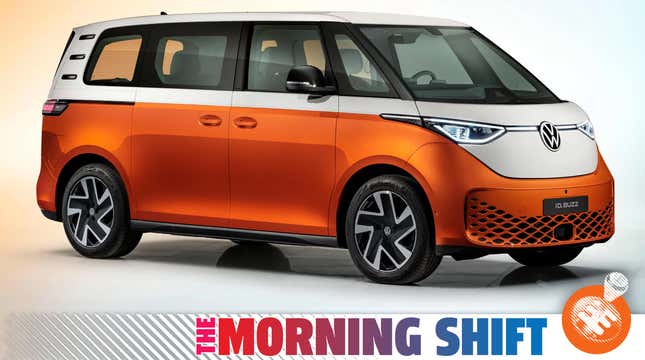
Elon Musk is going to Germany, the Volkswagen ID Buzz looks good, and Avtovaz. All that and more in The Morning Shift for March 21, 2022.
1st Gear: VW Thinks It Will Sell A Lot Of ID Buzzes
I’m not so sure that the ID Buzz will be a big hit, very much because it seems like a good car. It also seems quirky, or at least presents itself that way, recalling, of course, the Type 2, and quirky by definition is not a mass market thing, otherwise it wouldn’t be quirky, but, all of that said, VW still has high hopes. This thing is coming to America, too.
It might be the best EV we get in the States when it gets here in 2024, unless there is a cheap EV on the market then, not a strong likelihood.
From Automotive News.
“We want to sell around 120,000 units a year,” Volkswagen Passenger Cars CEO Ralf Brandstaetter said during a livestream of the company’s fiscal and product outlook for 2022 and beyond.
The ID Buzz is the “most emotional “ member of VW’s ID family of battery-electric cars, and has what it takes to become a bestseller, Brandstaetter said.
The ID Buzz has styling elements that recall the Microbus, which become an icon of the 1960s Hippie era. Much attention has been paid to the van’s two-tone paint scheme, retro-futuristic design, and eco-conscious selection of materials on the interior.
“The ID Buzz has been incredibly well received in the U.S. where it’s even a bit of a cult figure,” Brandstaetter said.
Advance orders for the ID Buzz are due to start in May, with deliveries scheduled to start in September in Europe in September where it will be sold as a passenger vehicle and in a cargo van version. The U.S. will get only the long-wheelbase version of the passenger van, with deliveries starting in 2024.
The U.S. will only get the worst version of a good EV, this says. Sounds about right.
2nd Gear: Dealers Have EV Worries
Automotive News also has a delightful report after going to the National Automobile Dealers Association expo in Las Vegas this month. Dealers there were in poor spirits, Auto News reports, because they are worried about their profit margins after the switch to EVs.
Dealers shouldn’t have to accept smaller profits or a business model change just because the powertrain is different, said Mike Sullivan, president of LAcarGuy dealerships in the Los Angeles area. Margins on EVs at his stores are not discernibly lower, he said.
“I’m not going to settle for smaller margins under the guise that they’ll pay my flooring or increase my co-op advertising,” Sullivan said during a panel discussion on EVs at the Automotive News Retail Forum: NADA. “I think that leads to a very dangerous place if we go from 13 to 6 percent. I suspect that the next call would be, ‘I bet we could get him to go for 5.75 or 5 [percent].’ “
The concern is not theoretical, as brands including Mercedes-Benz and Mini have asked dealers to accept lower margins on EVs.
Also someone there claimed that dealers are best for EV consumers.
While many consumers have a good impression of the Tesla brand, they don’t necessarily prefer its consumer experience, said Mike Dovorany, vice president of automotive and mobility at Escalent, a market research company. He conducted a massive survey of likely future EV buyers about their ideal approach to buying and servicing vehicles.
“We actually took the elements of the Tesla approach and we sort of de-badged them,” Dovorany said during an NADA Live session.
A major takeaway? The dealership model is a good one for mainstream consumers buying their first EV.
Consumers overwhelmingly said they like going to a dealership, having a human to interact with and not having to schedule service only through their phones, according to Escalent’s research.
It “really had us kind of raise our hand and say, ‘Hey, I know there’s a lot of discussion about moving towards this sort of more Tesla-like approach, but when we talk to the consumers ... they’re telling us that’s not their ideal’ “ experience, Dovorany said.
And also dealers are just worried in general.
Randy Hoffman, COO at Ed Morse Automotive Group, of Delray Beach, Fla., said the group has signed on for EVs at each of its dealerships. Ed Morse has about 30 franchised dealerships in Florida, Illinois, Oklahoma, Missouri, Texas and Iowa.
“That’s an expensive endeavor,” Hoffman said. “My concern with EV is that the technology is improving so rapidly that what we’re investing today may be antiquated within just a few years.”
Dealers are just the crabbiest bunch, probably because they know deep down that they are inessential.
3rd Gear: Avtovaz
Top Russian carmaker Avtovaz said on Monday it was partially halting production at its plants in Togliatti and Izhevsk on March 21-25 because of to shortages of electronic parts.
Avtovaz, controlled by French carmaker Renault (RENA.PA), has periodically stopped its production this month over these shortages.
Renault produces two models - Logan and Sandero - for the Russian market in Izhevsk, along with LADA models. Avtovaz said the LADA Izhevsk plant will continue producing its Vesta model and vehicles from Renault’s B0 platform on March 21-22.
Avtovaz.
4th Gear: Elon Musk Going To Berlin
Tesla’s long, tortured, nightmare of a new plant in Germany is now, it appears, good to go, and so there is an opening ceremony and all of that on Tuesday, according to Automotive News. Tesla CEO Elon Musk is headed to Germany for it, and German Chancellor Olaf Scholz will also be there.
Musk was headed to Berlin from Austin, Texas, the Twitter user @ElonJet, who tracks the movements of Musk’s private jet, posted on Monday.
Musk plans to personally hand over to customers the first Model Y cars built at the factory, German press reports said.
German Chancellor Olaf Scholz is also scheduled to attend the opening of the factory in Gruenheide, 22 miles southeast of Berlin.
Scholz will give a welcome speech at the opening ceremony, but there may be changes at short notice because of the Ukraine war, a government spokeswoman said.
The fact that the Chancellor is showing up for the opening suggests that the opening itself was never really in doubt.
5th Gear: Trucking Automation
It has been said that trucking in America is ripe for automation, and that driving a truck is an endangered blue-collar job, and that we should all panic. I’m not sure that’s is true, because I don’t think self-driving cars or trucks are a near-term thing. Still, a new study says that 500,000 drivers’ jobs could be at risk if it does come to pass. The interesting thing here is that the study says that drivers will still be needed, just not for the tedious stretches on interstates.
From Bloomberg:
The biggest hurdle may be infrastructure. The short trip from a factory or distribution center to an interstate is usually far more complicated than the next several hundred miles. The same is true once the machine exits the interstate. One solution is for trucking companies to set up transfer stations at either end, where human drivers handle the tricky first leg of the trip and then hitch their cargo up to robot rigs for the tiresome middle portion. Another station at the exit would flip the freight back to an analog truck for delivery.
Such a system, according to a new study out of the University of Michigan, could replace about 90% of human driving in U.S. long-haul trucking, the equivalent of roughly 500,000 jobs.
“When we talked to truck drivers, literally every one said, ‘Yeah, this part of the job can be automated,’” explained Aniruddh Mohan, a PhD candidate in engineering and public policy at Carnegie Mellon University and a co-author of the study. “We thought they would be a bit more dubious.”
Reverse: Ayrton Senna Born
Unless Lewis Hamilton goes on to win another championship or two, the debate over greatest ever Formula 1 driver will rage on between Senna, Fangio, Hamilton, and Schumacher. Either way, it’s still probably Hamilton.
Neutral: How Are You?
I went bowling on Friday night and emerged almost immobile the next morning from the exertion. Low moment.
